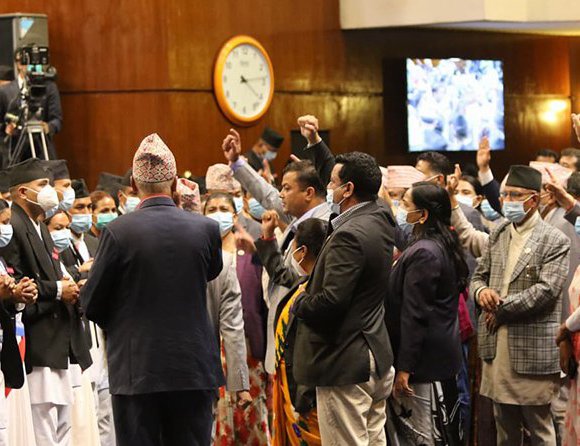Editorial: What to expect of Deuba?
Sher Bahadur Deuba’s failings as a national and party leader are well-known. He is notorious for all kinds of wheeling and dealing to remain in power. But as a five-time prime minister and a repeat Nepali Congress president, this might also be the right time to revisit his signature strengths: his unmatched organization prowess, his keen sense of the shifting sands of power, and his ability to get the right people to back him at the right time. Having secured a thumping victory in the race for party presidency, the 75-year-old seems to be at his politicking best.
But what next? Can Deuba improve on Nepali Congress’s performance in the previous elections? If the 2017 provisional and federal elections are any guide, his public appeal seems to be shrinking and, frankly, he hasn’t done much in the past four years to make them rethink. The Congress party could have done with a new leader, just as there is a desperate need for churning at the top of the CPN-UML and CPN (Maoist Center). But now that the party and the country is stuck with Deuba, what can we expect of him?
Also read: Editorial: The Nepali Congress tamasha
One good aspect of Deuba’s leadership is his ability to hold the loosest of coalitions, something he has done during all of his five tenures as prime minister. The presence of such an accommodating figure at the top of national politics bodes well for the otherwise fissiparous polity. Also, we should not forget Deuba’s role in successfully holding the 2017 elections, even if the results didn’t go his party’s way. Arguably, Deuba is more of a conciliator than KP Sharma Oli or Pushpa Kamal Dahal, the country’s two other top leaders.
If Deuba can again preside over timely and free and fair elections, he will have played a vital role. That is a very low bar to clear for the country’s executive head and the chief of its oldest and traditionally most powerful political party. But then Deuba is only a reflection of the state of our broader polity and society. Transformation in Nepal is a slow process.
Editorial: The Nepali Congress tamasha
Nepali Congress, the party that has led every major political change in the country in the past seven decades, now appears to be a shell of its former self. Perhaps for the first time in the party’s history, going into its General Convention, there has been zero debate on its future ideological course or the country’s burning issues. All the debates rather seem centered on which of the many candidates vying for leadership, largely based on their ability to dispense patronage, will prevail. Things couldn’t be more dispiriting.
Right now, the country is mired in some bitter ideological questions, regarding the future of its federal and republican structure, the judiciary’s independence, a long-running pandemic that is still not under control, a sinking economy and growing inequality—and all that the party traditionally at the vanguard of the Nepali democratic process is concerned about is choosing a new leader. That would not be such a bad thing if the top NC leaders were contesting based on their ideological differences and differing visions for the party and the country. No, all they seem concerned about is getting elected in any which way possible.
Also read: Editorial: Exclusionary UML
Whosoever becomes the next Nepali Congress head, he—and it will be a ‘he’—will fail to inspire broader confidence. All the candidates in the fray are old faces, and people, more than anything else, would like to see a fresh face at the top. Also, the weakening of the political parties across the board could translate into another fractured mandate in the next set of elections, with all its attendant problems.
The election of Rajendra Lingden as the RPP chief is, in this way, a breath of fresh air, for he is both a new generation leader and has a solid ideological footing. Yet he leads a political party that wants to take the country back decades by reviving monarchy and Hindu state. It is ironic that the RPP should be teaching our more mature democratic parties the way to elect a new leader.
Editorial: Exclusionary UML
The constitution of Nepal 2015 requires political parties to ensure “such inclusive representation in its executive committees at various levels as may be reflecting the diversity of Nepal”. CPN-UML and its (reelected) Chairman KP Sharma Oli have made a mockery of the provision by selecting a single Madhesi and a couple of women in its new 19-member office-bearers team. Women comprise over half of the national population while the Madhesi-Tharu cluster make up over 33 percent. Yet they are minimally represented. Tharus and Muslims have been completely excluded. This is not the make-up of a national political party.
This panel of office-bearers is unconstitutional and hence liable to legal challenge. More than that, it is indicative of our major political parties’ blatant disregard for inclusion. The situation is not much different in Nepali Congress, CPN (Maoist Center) or the newest kid in the block, CPN (Unified Socialist). Yet even among them, UML fares the worst. The party had a great opportunity to clean up its ‘anti-Madhesi’ and ‘anti-inclusion’ image this time, yet the incumbent chairman decided to give continuity to the status quo by ramrodding his handpicked list of nominees for various party organs.
Also read: Editorial: Heed conflict victims
For long UML has been seen as a status quoist force that owes its rise to the traditionally dominant communities, and its stranglehold over the NGO sector from which it mints money to plough into national elections. There is also little to suggest that the party believes in its stated ideology of ‘people’s multiparty democracy’ which, at its heart, was aimed at reflecting Nepal’s ethnic, linguistic and religious diversity in party hierarchy and programs.
Oli has calculated that he needs a coterie of trusted lieutenants to effectively run the party, so what if most of them share similar ethnic backgrounds? The broader calculation is that pandering to traditionally privileged caste groups, the core UML vote-bank, will again pay off come election-time. In next-door India Narendra Modi has shown the electoral effectiveness of catering almost exclusively to the adherents of one religion. Nepal’s top politicians have likewise chosen to follow their majoritarian instincts, to the detriment of the new federal republic.
Editorial: Heed conflict victims
Lack of resources has never been the problem with Nepal’s transitional justice process, even though paucity of manpower and money for the two transitional justice bodies are a symptom of the underlying malaise. The root malady continues to be an utter lack of political will. There is zero political will to carefully investigate war-time rights abuses and to prosecute the guilty. This is certainly so with the two main parties of the current ruling alliance: Nepali Congress and CPN (Maoist Center).
Top Maoist leaders fear any kind of in-depth investigation could snare them. The same applies to some senior Nepali Congress leaders like Sher Bahadur Deuba and Krishna Prasad Sitaula who were in top government positions as the state tried to suppress the Maoist insurgency. Then there is the Nepal Army—which led anti-insurgency efforts in the second half of the decade-long conflict—that has repeatedly thwarted any attempt at fair and independent investigation. With such powerful forces arrayed against them, no wonder thousands of conflict victims await justice.
Also read: Editorial: Nepal COP-ing badly
Fifteen years since the signing of the Comprehensive Peace Agreement to formally end the civil war, conflict victims are no closer to a closure. The hope of the abovementioned actors is that the issue of transitional justice will fade away with time. Yet the pain of the families that lost their loved ones—who were either killed or ‘disappeared’ during the conflict—won’t go away so easily. In fact, the longer they are kept waiting, the more the old wounds will fester, which in turn will increase the risk of the conflict reigniting or of a new one flaring up. Nor will the international community easily forget, and Nepal’s image abroad will continue to suffer.
The Maoist insurgency happened as large sections of the Nepali society felt left out of the political and social mainstream. This is still the case today. The importance of addressing the grievances of the marginalized sections of the society—and no group has been as marginalized and mistreated in recent times as the conflict victims—and bringing them into the national mainstream thus cannot be exaggerated. Only then a truly inclusive society be created and only then will lasting peace be ensured.


















